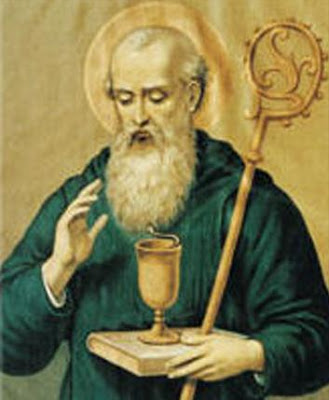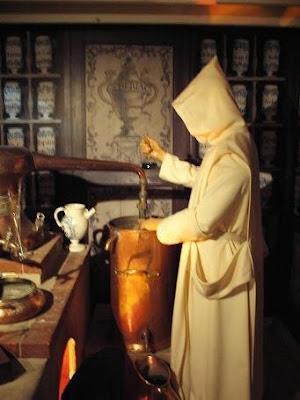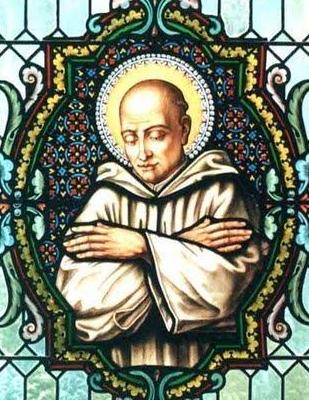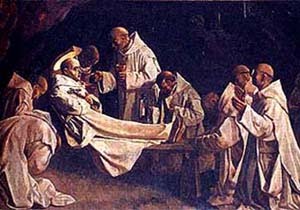 Today on this feast of Saint Benedict, at Matins the Carthusians reflected on the following from The Life of Saint Benedict:
Today on this feast of Saint Benedict, at Matins the Carthusians reflected on the following from The Life of Saint Benedict:
Benedict, desiring rather the miseries of the world than the praises of men: rather to be wearied with labor for God's sake, than to be exalted with transitory commendation: fled privately from his family, and went into a desert place called Subiaco, distant almost forty miles from Rome: in which there was a fountain springing forth cool and clear water; the abundance whereof does first in a broad place make a lake, and afterward running forward, comes to be a river. As he was travelling to this place, a certain monk called Romanus met him, and demanded to know what he wanted, and understanding his purpose, he both kept it close, furnished him what he could, vested him with the habit of holy conversation, and as he could, ministered and served him. The man of God, Benedict, coming to this foresaid place, lived there in a narrow cave, where he continued three years unknown to all men, except to Romanus. He lived not far off, under the rule of Abbot Theodacus, and very virtuously studied certain hours, and likewise sometimes a loaf was given for his own provision, which he carried to Benedict. And because from Romanus' cell to that cave there was not any way, by reason of a high rock which hung over it, Romanus, from the top thereof, on a long rope, let down the loaf.
Not far from the place where he remained there was a monastery, the Abbot whereof was dead: whereupon the whole Convent came to the venerable man Benedict, entreating him very earnestly that he would vouchsafe to take on him the charge and government of their Abbey: a long time he denied them, saying that their manners were different from his, and therefore that they should never agree together: yet at length, overcome with their entreaty, he gave his consent. Having now taken on him the charge of the Abbey, he took order that regular life should be observed, so that none of them could, as before they used, through unlawful acts decline from the path of holy conversation, either on the one side or on the other: which the monks perceiving, they fell into a great rage, accusing themselves that ever they desired him to be their Abbot, seeing their crooked conditions could not endure his virtuous kind of government. Therefore, when they saw that under him they could not live in unlawful sort, and were loath to leave their former conversation, and found it hard to be enforced with old minds to meditate and think on new things: and because the life of virtuous men is always grievous to those that be of wicked conditions, some of them began to devise, how they might rid themselves of Benedict.
Taking counsel together, they agreed to poison his wine: which being done, and the glass wherein that wine was, according to the custom, offered to the Abbot to bless, he, putting forth his hand, made the sign of the cross, and straightway the glass, that was held far off, broke in pieces, as though the sign of the cross had been a stone thrown against it: on which accident the man of God by and by perceived that the glass had in it the drink of death, which could not endure the sign of life. Rising up, with a mild countenance and quiet mind, he called the monks together, and spoke thus to them: "Almighty God have mercy on you, and forgive you: why have you used me in this manner? Did not I tell you before hand, that our manner of living could never agree together? Go your ways, and seek out some other father suitable to your own conditions, for I intend not now to stay any longer among you." When he had thus discharged himself, he returned to the wilderness which so much he loved, and dwelt alone with himself, in the sight of his Creator, Who beholds the hearts of all men.
As God's servant daily increased in virtue and became continually more famous for miracles, many were led by him to the service of almighty God in the same place. By Christ's assistance he built there twelve Abbeys; over which he appointed governors, and in each of them placed twelve monks. A few he kept with himself; namely, those he thought would gain more profit and be better instructed by his own presence. At that time also many noble and religious men of Rome came to him, and committed their children to be brought up under him for the service of God. Evitius delivered Maurus to him, and Tertullius, the Senator, brought Placidus. These were their sons of great hope and promise: of the two, Maurus, growing to great virtue, began to be his master's helper; but Placidus, as yet, was but a boy of tender years.
In one of the monasteries which he had built in those parts, there was a monk who could not continue at prayers; for when the other monks knelt down to serve God, his manner was to go forth, and there with wandering mind to busy himself about some earthly and transitory things. One day, Benedict came to the monastery, and when the singing of psalms was ended, and the hour come in which the monks took themselves to prayer, the holy man perceived that the monk, who used at that time to go forth, was drawn out by the skirt of his garment by a little boy. On seeing this, he spoke secretly to Pompeianus, father of the Abbey, and also to Maurus saying, "Do you not see who it is, that draws this monk from his prayers?" and they answered him, that they did not. "Then let us pray to God," he said, "that you also may behold whom this monk follows." After two days Maurus saw him, but Pompeianus could not. On another day, when the man of God had ended his devotions, he went out of the oratory, where he found the foresaid monk standing idle. For the blindness of his heart he struck with a little rod, and from that day forward he was so freed from all allurement of the little boy, that he remained quietly at his prayers, as the other monks did.
The town, which is called Cassino, stands on the side of a high mountain, which contains, as it were in the lap thereof, the foresaid town, and afterward so rises in height the space of three miles, that the top thereof seems to touch the very heavens. In this place there was an ancient chapel in which the foolish and simple country people, according to the custom of the old gentiles, worshipped the god Apollo. Round about it likewise on all sides, there were woods for the service of the devils, in which even to that very time, the mad multitude of infidels offered most wicked sacrifice. The man of God coming there, beat the idol into pieces, overthrew the altar, set fire to the woods, and in the temple of Apollo, he built the oratory of Saint Martin, and where the altar of the same Apollo was, he made an oratory of Saint John. By his continual preaching, he brought the people dwelling in those parts to embrace the faith of Christ.
Once upon a time, while the venerable Father was at supper, one of his monks, who was the son of a great man, held the candle. As he was standing there, and the other ate his meal, he began to entertain a proud thought in his mind. He spoke to himself: "Who is he, that I wait on him at supper and hold him the candle? And who am I, that I should do him any such service?" Immediately the holy man turned and with severe rebuke spoke to him: "Sign your heart, brother, for what is it that you say? Sign your heart." Forthwith he called another of the monks, and bid him to take the candle out of his hands. He commanded him to cease his waiting, and to retire. Benedict, being demanded of the monks what it was that he had thought, told them, how inwardly that monk had swelled with pride, and what he spoke against the man of God, secretly in his heart. Then they all realized very well that nothing could be hidden from venerable Benedict, seeing that the very sound of men's inward thoughts came to his ears.
The man of God, Benedict, being diligent in watching, rose early before the time of Matins, his monks being yet at rest, and came to the window of his chamber where he offered up his prayers to almighty God. Standing there, all of a sudden in the dead of the night, as he looked forth, he saw a light that banished away the darkness of the night and glittered with such brightness that the light which shone in the midst of darkness was far more clear than the light of the day. During this vision a marvelously strange thing followed, for, as he himself afterward reported, the whole world, gathered together, as it were, under one beam of the sun, was presented before his eyes. While the venerable father stood attentively beholding the brightness of that glittering light, he saw the soul of Germanus, Bishop of Capua, in a fiery globe, carried up by Angels into heaven. All creatures are, as it were, nothing to that soul that beholds the Creator. For though it sees but a glimpse of that light which is in the Creator, yet all things that are created seem very small. By means of that supernatural light, the capacity of the inward soul is enlarged, and is so extended in God, that it is far above the world. The soul of one who sees in this manner, is also above itself; for being rapt up in the light of God, it is inwardly in itself enlarged above itself. When it is so exalted and looks downward, it comprehends how little all creation is. The soul, in its former baseness, could not so comprehend. The man of God, therefore, who saw the fiery globe, and the Angels returning to heaven, could, no doubt, not see those things but in the light of God.
 A museum? The word is inappropriate. For there is no orderly display of works of art here, nor historical souvenirs regarding the Order of the Carthusians, but rather an evocation of Carthusian life. And this, on the very site on which, in 1084, André and Guérin set up their Brothers' cells, their oratory, their workshops, and their modest sheepfold. The buildings have undergone many transformations since then, but "the walls", so to speak, are authentic: tourists can walk around today in the place where Carthusian monks, especially the Brothers, lived, prayed and worked. All around stands the wonderful circle of mountains, forests and fields, the motionless and inviolable witnesses of nine long centuries of history. How vast it is, this museum!
A museum? The word is inappropriate. For there is no orderly display of works of art here, nor historical souvenirs regarding the Order of the Carthusians, but rather an evocation of Carthusian life. And this, on the very site on which, in 1084, André and Guérin set up their Brothers' cells, their oratory, their workshops, and their modest sheepfold. The buildings have undergone many transformations since then, but "the walls", so to speak, are authentic: tourists can walk around today in the place where Carthusian monks, especially the Brothers, lived, prayed and worked. All around stands the wonderful circle of mountains, forests and fields, the motionless and inviolable witnesses of nine long centuries of history. How vast it is, this museum!
























